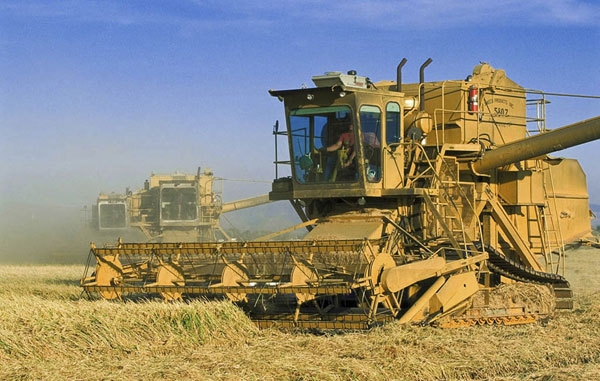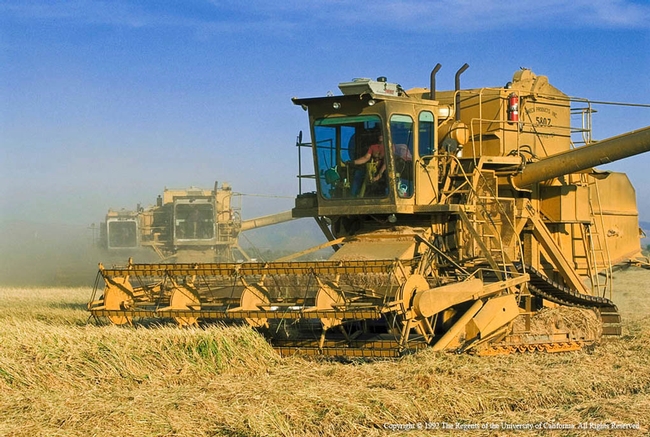Posts Tagged: Chris Greer
Rice planting moving along despite tight water supplies
Rice planting in California is well underway and taking place more quickly than expected, reported Heather Hacking in the Oroville Mercury Register.
Despite early worries about water supplies, Cass Mutters, UC Cooperative Extension advisor in Butte County, said 25 to 30 percent of rice acreage is planted; statewide about 10 to 15 percent of acreage has been planted. According to the article, rain in March delivered enough water to Lake Oroville for full water contracts to be honored.
Things could have turned out a lot worse, said Chris Greer, UCCE adviser in Sutter, Yuba, Sacramento and Placer counties.
A month ago it looked like 200,000 acres statewide would go without being planted, of a total of about 550,000 acres of rice land.
Greer told the reporter that farmers are still deeply concerned about the California water situation.
"It still worries you thinking about this winter," Greer said. "We're eking by as we can this year, but if we have another dry winter, I'm not sure we're going to be able to meet what we are delivering this year. That would be difficult."
Most rice is planted by airplane, but some farmers are experimenting with drill seeding. Drill seeding requires more labor, but results in more precise placement of seed and fertilizer in the fields.
Agriculture research not immune to drought
Fitchette opened his story with the plight of ag research at the UC West Side Research and Extension Center near Five Points. Many of the farmers in the area will receive no surface water allocation this year; neither will the research center.
The facility can pull water from a deep well, but it is not enough nor is the water quality adequate for all the farming operations, said Bob Hutmacher, UC Cooperative Extension specialist and center director. He said scientists at the station must cut back their water use this year by 25 percent.
“I can speak for myself: I have about a half dozen cotton projects and a sorghum project, along with a sesame project and a couple of other things I'm working on,” he said. “I'm downsizing most of them to the greatest degree I can and I'm going to cancel one of them.”
One trial that will not go forward at West Side is an almond variety trial. However, UC Cooperative Extension advisors in other areas are working with the Almond Board to keep the research underway. UCCE advisors Joe Connell will oversee the Chico State almond variety trial, Roger Duncan the Salida trial, and Gurreet Brar the Madera County trial.
The Western Farm Press Story included drought-related ag research news from myriad UCCE academics:
- Duncan said his work with fruit and nut crops has not been negatively impacted by the drought.
- David Doll, UCCE advisor in Merced County, said the increased reliance on groundwater has ruined several orchard nitrogen trials because the groundwater in northern Merced has high rates of nitrate nitrogen, which acts as a nitrogen fertilizer.
- Dan Munk, UCCE advisor in Fresno County, said he will continue putting off alfalfa trials at the WSREC “indefinitely until a more secure water supply is available.”
- Scott Stoddard, UCCE advisor in Merced County, reports positive and negative impacts from the drought. He won't do tomato research at West Side REC, but will continue work in sweet potatoes to determine how little water they need to produce a reasonable crop.
- Chris Greer, UCCE advisor in Sutter, Yuba, Colusa and Glenn counties, said some rangeland trials were impacted by the lack of rain.
- Bruce Lampinen, UCCE specialist in the Department of Plant Sciences at UC Davis, has seen his orchard trials in Arbuckle severely impacted by the drought.
Catching up on UC Cooperative Extension news over the holidays
The Redding Appeal Democrat reported in December that the ranks of U.S. farmers is dwindling. Said Sutter County almond grower Mat Conant, "Pretty soon we'll be such a small minority nobody will listen to us."
Fewer farmers means there are fewer lawmakers with first-hand knowledge of agricultural production.
"You can go to Washington, D.C., and talk about agriculture, but it doesn't have the same impact if you practically experience it," said Christopher Greer, UC Cooperative Extension director for Yuba and Sutter counties.
Lawmakers, like the people they represent, can be lulled into believing that America will always benefit from food costs significantly lower than in Europe, Greer added.
"Everyone gets a little complacent," Greer said. "We expect food to be available at a fairly reasonable price."
Historical Society presents a 'Centennial Celebration'
(Eureka and North Coast) Times-Standard
A meeting at the historical society on Jan. 5 began a year-long celebration of three Humboldt County agricultural organizations that are celebrating 100 years of service in the community: the University of California Cooperative Extension, Humboldt County 4-H Clubs and the Humboldt County Farm Bureau.
Speakers at the event, including Yana Valachovic, UCCE director in Humboldt County, were slated to highlight the roles of each of these organizations in working with youth, commodity producers and the community over the last 100 years. Many events and presentations throughout 2013 will celebrate the local agricultural community.
Far West High Cotton winner committed to finding better ways
Harry Cline, Western Farm Press
Third-generation Merced County farmer Chad Crivelli received this year's Farm Press/Cotton Foundation High Cotton Award for the Western States.
Pete Goodell, UC Cooperative Extension advisor in integrated pest management, was quoted in the Western Farm Press article announcing Crivelli's award.
"Chad meets with people during field trips to share the story about sustainable cotton," Goodell said. "He is a great spokesperson for urban folks who don’t understand what’s going on in cotton industry. He represents the cotton industry incredibly well, and the High Cotton Award is a well-deserved honor for Chad."
Crop issues test Coachella Valley vegetable producers
Cary Blake, Western Farm Press
Jose Aguiar, UC Cooperative Extension advisor in Riverside County, recounted a surprising problem with Coachella Valley peppers in 2012 at the recent Desert Crops Workshop in El Centro.
“This problem threw us for a loop,” Aguiar said. “The bell pepper had a silvering appearance on the fruit exterior. It was not found inside the fruit. It was strictly a cosmetic issue.”
Riverside County is the largest bell pepper producer in California. The Coachella Valley has about 5,000 acres of bell peppers with a farm gate value of about $90 million.
UCCE advisor Richard Smith of Monterey County has found a similar problem in red pepper fields in the Salinas Valley. After testing, Smith’s first guess is the problem could be caused by the fruit rubbing against a branch. There are no holes in the fruit which eliminates the idea of insect damage.
Victor Gibeault named 2013 USGA Green Section Award Recipient
Cybergolf
Victor Gibeault, UC Cooperative Extension specialist emeritist in the UC Riverside Department of Botany and Plant Sciences, received the 2013 USGA Green Section Award in recognition for distinguished service to golf through his work with turfgrass.
"I am both pleased and honored to have been selected to receive the USGA Green Section Award," said Dr. Gibeault. "Now retired, I have been fortunate to spend my career as a University of California Cooperative Extension specialist, and in that role, I have worked on turfgrass research issues and educational projects and programs. My activities with the golf course industry have been enjoyable, fruitful, and have given me a sense of personal accomplishment, for which I am grateful."
Gibeault holds the U.S. patents for two zoysiagrass cultivars, De Anza and Victoria, and one buffalograss cultivar, UC Verde. Additionally he co-edited the 1985 book, "Turfgrass Water Conservation."

A significant number of articles publicized UCCE activities during the winter break.
Rice harvest expected to be good
As California rice fields begin to be harvested this week, farmers and UC experts say the yield is expected to be good, but unremarkable, said an article by Ching Lee in the Central Valley Business Times.
"It looks like it's going to be an OK harvest," said Butte County rice farmer Michael Arens.
Yields should be "somewhat average," the article quoted Chris Greer, UC Cooperative Extension advisor for Yuba, Sutter, Placer and Sacramento counties.
A hot spell in August limited flowering in some cases, but the warm weather also helped control the fungal plant disease rice blast.
"In a year like this, unless we start getting heavy rains, (harvest) is probably going to turn out fairly good," Greer said.
A Chico farmer reported a problem with weeds this year. Luis Espino, UCCE advisor for Glenn, Colusa and Yolo counties, said UC researchers confirmed last year that smallflower umbrella sedge has become resistant to one of the main herbicides that growers use to control it.
"We'll probably see more of (the resistant weed) as time goes by," Espino said.
Rice growers optimistic; seeking biomass growers
The (Marysville) Appeal-Democrat checked in on the rice harvest which started recently, with an article by reporter Ashley Gebb. USDA reports that harvested acreage for rice in California is up 6 percent this year, to 588,000 acres; in 2010, Yuba and Sutter counties had approximately 154,000 acres planted in rice. The reporter talked to Chris Greer, UC Cooperative Extension farm advisor for Sutter-Yuba and Colusa counties, about what this summer's cooler weather means for the rice harvest. "Overall things look pretty good from a yield standpoint," he told the reporter. "We will have to see what the numbers come out. From what we are seeing, we are pretty optimistic on the prospects."
Harvesting jet fuel
Kathy Johnston, (San Luis Obispo) New Times
Reporter Kathy Johnston examined both government and grower interest in camelina sativa, an oilseed crop that can be used in jet fuel. Growers interested in camelina can sign up for USDA's Biomass Crop Assistance Program, the deadline for which has been extended. The reporter talked with Steve Kaffka, UC Cooperative Extension agronimist in Davis and director of the California Biomass Collaborative, who is seeking cooperating growers for trial plantings of camelina under local conditions this winter. “It hasn’t been adapted specifically for California. We’re trying to figure out what conditions it likes, the range of rainfall and soil types where it might be suitable in San Luis Obispo County,” Kaffka told the reporter.
She also talked to Royce Larsen, UC Cooperative Extension natural resources advisor in San Luis Obispo county, who explained that though meetings about the crop have been well attended, no San Luis Obispo growers have signed up for the program yet. “A lot of people showed up [at a meeting about camelina in Templeton] with great interest, but they left, I think, a little downhearted,” Larsen told the reporter. “The bottom line is it’s too new, with too many unknowns for people to want to jump on board and give this a try."
(Though this article is about San Luis Obispo county, other California counties included in this project area are Butte, Colusa, Fresno, Glenn, Kern, Kings, Madera, Merced, Riverside, Sacramento, San Joaquin, Solano, Stanislaus, Riverside, Tehama, Tulare and Yolo, according to an article on the California Ag Network website.)




